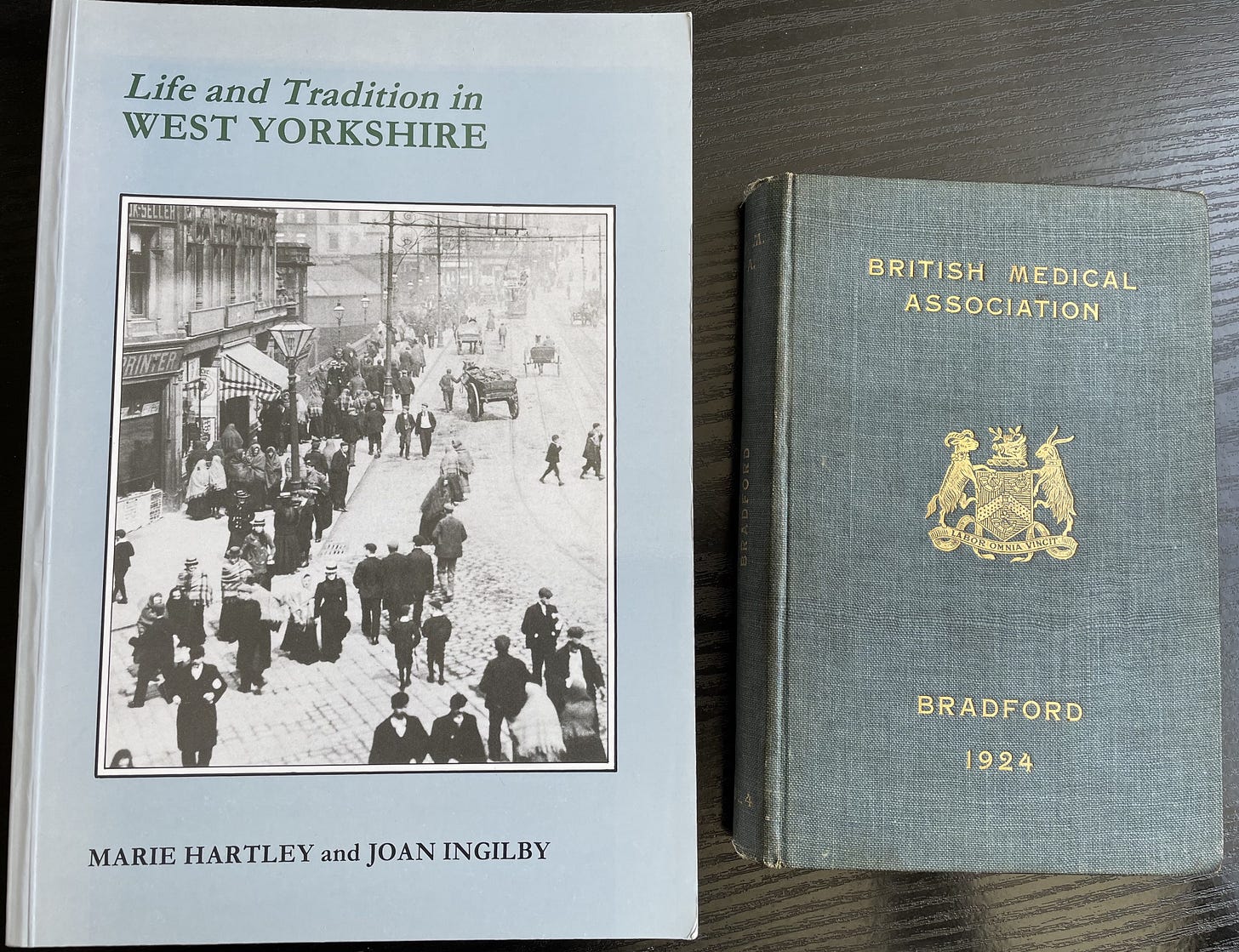Last weekend I went to the annual Ilkley Book Fair, where sellers of second-hand and antiquarian books from all over the UK set up stalls in two adjoining halls and try to entice booklovers who have time and money to spare. I happened to be wearing jeans and an Iron Maiden T-shirt, which put me in mind of the scene in Happy Days where the Fonz reveals his library card (as did every one of the hundreds of trips to the library I made while wearing my biker jacket1). Interestingly — thankfully, given I’m 45 and they presumably want these events to continue — I was not the youngest person there: I saw two or three twenty-somethings who didn’t appear to be humouring a middle-aged parent on a weekend visit.
The bulk of the small crowd though were, as you might expect, older than me and comfortably off. I was having a great time eavesdropping as I worked my way methodically along the shelves, perusing spines. There was the man who’d inherited a book he thought might be valuable and was showing photos to booksellers in case they wanted to buy it (they didn’t, or not from a photo). Several couples were looking to downsize now the kids had gone, and were discussing the sale of vast swathes of their book collections, particularly the 1970s and 80s children’s books.
Stallholders were wandering over to each other and chatting while keeping one eye on a browser in case they wanted to buy. Are you going to the next book fair, did you go to the last one, how is this weekend turning out for you? The answers to how it was going were largely noncommittal; I guess you don’t want to sound too buoyant if you think others might be having a bad day, and you don’t want to sound like you’re doing badly if you have a feeling it’s just you.
Part of the fun of going to book fairs is to see what books exist, what arcane subjects someone has bothered to commit to paper. Yes there are modern first editions, and boxes of paperback Agatha Christies for a couple of quid each, but it’s the other books that interest me. The twentieth century niche volumes, out of print and hard to get hold of2, if not actually rare as such. And the Victorian and older, the leather bound and occasionally mouse-nibbled, from the popular editions to the true one-offs.
I saw histories of a whole host of different parishes in the north of England. Falconry in Arabia. Candles and Candlesticks. Church woodwork. A handbook on India and Ceylon for travellers and residents. Traditional farm buildings of North Wales. There were early editions of Bewick’s birds, two or three different books on the watermills of Cumbria. Everyone seemed to have a leather-bound edition of Cowper’s poems, and Dr Collyer’s3 book on Ilkley. As usual there were the books I daren’t even take off the shelf (a 2-volume survey of Turnpikes and Tollbooths! Imagine…), the innocent-looking one that I thought might prove useful to me but turned out to be over £100. The ones I expected to cost about a tenner but were in the £40-£60 range — there are always quite a few of them, this time including books about Whitby ships and Durham miners. Clearly I need to recalibrate my cost assessments.
And yet, I didn’t see a single copy of JB Priestley’s The Good Companions, which I’ve been meaning to buy for a while. Not even an outrageously priced copy that I wasn’t prepared to fork out that much for. It was an enormously popular novel when it came out, and although it doesn’t seem to be in print now it has gone through several editions. There must be thousands if not millions of copies kicking around somewhere. Where have they all got to?
Almost every stall had books my parents own or used to own, that brought back fond memories. Walking books about Cumbria and the Yorkshire Dales, old paperback editions of Maigret or PG Wodehouse. The 1960s and 70s editions they bought new are now old and collectible, and the ones that were already old when they bought them in charity shops or Michael Moon’s in Whitehaven during my childhood are now decades older and a lot more expensive. Increasingly I see books I own too; I get a brief rush of excitement at what looks like a great book and then realise I either have it, or have read it or, occasionally, both. But it doesn’t stop me looking, and no doubt I’ll be there again next year.
Sadly more or less retired ten years ago when my back knackered and it was too heavy for general wear
I know I could probably find them online, but I very, very rarely look. It’s partly about the serendipity for me
I remember talking about him when Ilkley Writers did an evening of readings at Ilkley library and I presented a short history of the building, but I can’t remember anything about him now.


